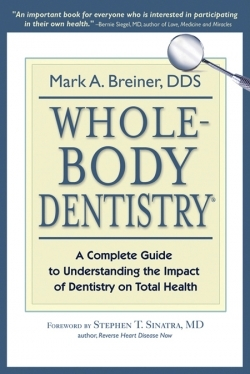Whole-Body Dentistry
A Complete Guide to Understanding the Impact of Dentistry on Total Health
- 2011 INDIES Finalist
- Finalist, Health (Adult Nonfiction)
Harvard scientists recently concluded that adding fluoride to water can probably cause significant neurological damage in children. Yet many conventional dentists would work to keep the chemical added to the water supply for benefits to teeth that it may or may not provide when ingested. Should it be any surprise that most dentists are unwilling to treat mercury fillings as a public health crisis or to accept that the former wisdom regarding other popular dental treatments, from root canals to implants, may be wrong?
Holistic dentists believe that what happens in our mouths affects our entire bodies. Accordingly, Dr. Mark Breiner’s book introduces us to the concepts of acupuncture meridians residing at each tooth’s nerve, the sometimes physically debilitating bone cavitations that can occur where a tooth has been extracted, neurologically significant electrical problems arising from metal(s) in the mouth, and other concepts readers may be unfamiliar with. As the author suggests, if so-called silver fillings are actually 50 percent mercury, constantly releasing methyl mercury vapor, how could this fact not be problematic for patients’ overall health?
The “Dental Detective Stories” featured in Breiner’s book illustrate the capacity of proper dental care to treat the whole person, featuring actual case studies in which an atrophied calf muscle was resolved with homeopathy performed on a cavitation, severe dermatitis was cured with the removal of a mercury filling, and the removal of a root canaled tooth presented the solution to severe pain in both the mouth and the shoulder. Understanding the reasons for patients’ seemingly miraculous recoveries is possible for anyone who reads this book, since all of the theories upon which Breiner’s treatments rest are carefully explained.
The author communicates the science and his methods in ways that are interesting and easy to understand, yet the book is far from facile. It’s meant for readers who think critically about their health, for policymakers curious about the public health issues presented by the methods of many dental practitioners, and even for dentists themselves who may be unfamiliar with some of the biological dentistry concepts within. Above all, Breiner stresses the importance of informed patient consent and knowing that various treatment options exist, a practice that can mean more in his practice than in others.
Reviewed by
Carrie Wallace
Disclosure: This article is not an endorsement, but a review. The publisher of this book provided free copies of the book and paid a small fee to have their book reviewed by a professional reviewer. Foreword Reviews and Clarion Reviews make no guarantee that the publisher will receive a positive review. Foreword Magazine, Inc. is disclosing this in accordance with the Federal Trade Commission’s 16 CFR, Part 255.

